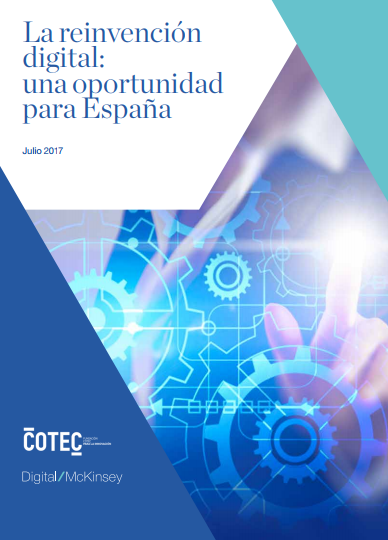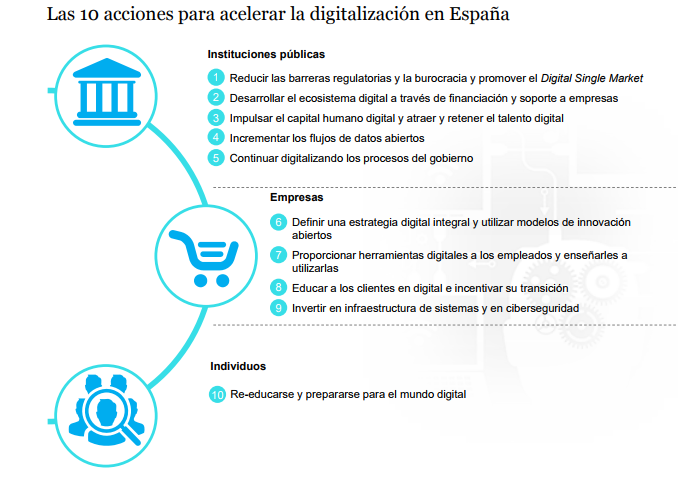Open data, a transformative element
Fecha de la noticia: 31-08-2017

Increasing the flow of open data is one of the major recommendations to accelerate digitalisation in Spain, as outlined in the report ‘Digital reinvention: an opportunity for Spain’, prepared by Fundación Cotec para la Innovación and Digital McKinsey. According to this report, published last July, digitalisation could mean lead to an increase in Spain’s GDP of between 1.8% and 2.3% per year until 2025. Today, the digital economy represents 5.6% of Spain's GDP.
The document highlights how the process of digitalisation is accelerating and transforming society as a whole and how we are currently presented with new innovations, including the Internet of Things, Big Data, and advanced analytics, as well as the impact that digital transformation has on all economic and social spheres, surveying the various waves of innovation and how they have shaped the digital economy. In particular, it refers to the companies that are leading this transformation and how many milestones have already been reached in the process of digitalisation in Spain.
Over 60 pages, the report describes how digitalisation functions as a lever to improve productivity and that this transition to the digital world requires a reconfiguration of the productive model. The better use of data to develop new products is, indeed, one of the keys to this process.
The report sets out a dozen proposals (chart attached) – one of them is the increase in open data mentioned above – to speed up digitalisation in Spain in the short term and notes that a joint effort between public institutions, the private sector, and citizens is a major precondition.

In particular, it specifies that prioritising the measurement and publication of national data is required in order to accelerate digitalisation, along with increased connectivity with other EU countries by means of the free flow of data. ‘Data sharing increases understanding between sectors and institutions and provides a basis for decision-making and creating applications that leverage Big Data.’ The report states that ‘Although Spain is the European leader in Open Data, more can still be done by participating in the various initiatives to integrate European data infrastructure.’ In this sense, the report supports the Open Science Cloud, created to connect researchers from all over Europe, allowing them to store and share data between countries, and recommends doing everything possible to encourage initiatives of this nature, as well as continuing to work on the integration and publication of national data.
This report provides examples of how governments around the world are joining the trend of making their data public. For example, several cities in China, such as Beijing, Shanghai, or Chongqing, have launched pages that allow citizens to freely access government data. More than 400 databases published by the city of Beijing provide information about tourism, education, transport, land use, and medical treatment. Companies are using this data to create applications that facilitate urban mobility and even help prevent disease.
Another of the examples of open data is that of Boston About Results, a performance measurement platform launched in 2006 in the city of Boston (USA) that publishes performance data from various departments and projects. ‘By publishing the data, it increases the accountability of public officials, advances the public administration's transparency, and strengthens management by providing officials with tools,’ it states.
The study advocates the use of digital technologies to improve R&D. ‘The availability of large amounts of data and the ability to analyse it would not only help to improve the speed at which new discoveries are generated but would also decrease the development time of new products through improved testing and quality measurement mechanisms. It concludes that ‘Computer-aided design and the data generated from production systems can help engineers to design the next generation of products’. Indeed, one of the main conclusions referring to the data in this report, ‘Digital reinvention: an opportunity for Spain’, is that the digitalisation of the economy favours the availability, tracking, and processing of data, which consequently allows an improvement in productivity.











